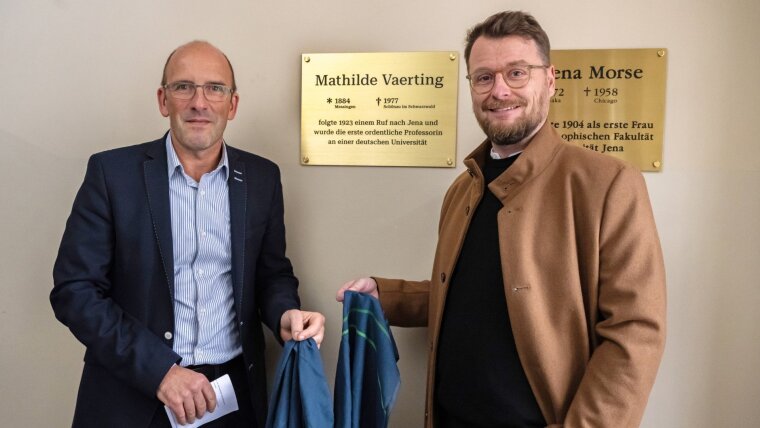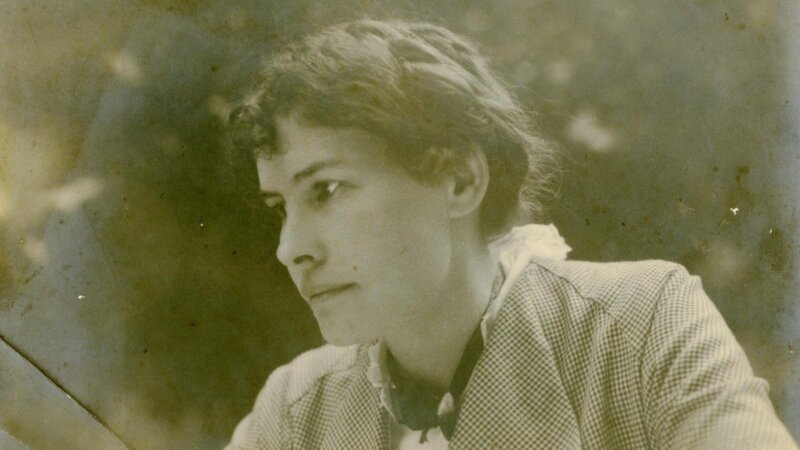
- Awards and Personnel
- Event
Published: | By: Sebastian Hollstein
The memorial plaque for Mathilde Vaerting, the first female full professor at a German university. She was appointed to the University of Jena on 1 October 1923.
Image: Jens Meyer (University of Jena)100 years ago, on 1 October 1923, the educationalist Mathilde Vaerting was appointed to the University of Jena - since today, Friday (3 November), a memorial plaque in the main university building (Fürstengraben 1) commemorates the first female full professor at a German university. With this initiative, the University, together with the Society for the Study of the History of Democracy (GEDG), is honouring the educator who was denied the respect she herself received during her time at the University of Jena. The Ministry of National Education had appointed her to the university against the wishes of the university management at the time - her almost ten years in Jena were characterised by harassment and hostility.
With this commemorative plaque, we are shining a light on the pioneer Mathilde Vaerting, who made history as the first female full professor at a German university. However, compared to Margarete von Wrangell, who was appointed as the first female professor at an agricultural university in the same year, Vaerting is only little known. This is also due to the fact that the National Socialists took away her professorship. It is long overdue that we commemorate her and in particular honour the scientist who was far ahead of her time with many of her studies and research approaches.
Prof Dr Georg Pohnert, interim director of the Friedrich-Schiller-Universität Jena
Mathilde Vaerting was a pioneer in all areas of her academic work. In her gender studies, she sharply analysed the structures of her time and provided emancipatory impulses. As the first female full professor at the University of Jena, she challenged the conservative circle of the old elites and met with their considerable resistance. Mathilde Vaerting paved the way for entire generations of researchers, and her perseverance and courage can still serve as a role model for us today.
Dr Christian Faludi, Society for the Study of the History of Democracy (GEDG)
Mathilde Vaerting.
Image: Universitätsarchiv Bielefeld, NLMW 707,1_30Symposium "Mathilde Vaerting - Signatures of a democratic pedagogy"
The plaque setting was the prelude to further events planned at the University of Jena: On 13 November at 2 pm, the Institute for Education and Culture invites you to the symposium "Mathilde Vaerting - Signatures of a Democratic Pedagogy" (please register by emailing sarah.elisabeth.ganss@uni-jena.de). As Sarah Elisabeth Ganss, who is organising the symposium, explains, Vaerting examined the relationship between society, power and domination and combined academic disciplines such as education, psychology and sociology in a unique way at the time. "She described social inequalities and did away with gender-specific prejudices, for example." She proved that girls and boys are equally gifted and thus contradicted the attributions of the time, which assumed that women were less talented than men in maths and science, for example. She called for equal treatment in order to enable a democratic education. "Vaerting anticipated many approaches that we find today in gender studies, for example," says Sarah Ganss.
Inaugural lecture and panel discussion with Minister Wolfgang Tiefensee
On 28 November at 6 pm, actress Johanna Geißler from the Deutsches Nationaltheater will present Mathilde Vaerting's inaugural lecture in the university auditorium. This will be followed by a panel discussion with the Thuringian Minister for Economic Affairs, Science and Digital Society Wolfgang Tiefensee, historian Annette Weinke, educationalist Bärbel Kracke (both from the University of Jena) and Christian Faludi from the GEDG.
"Mathilde Vaerting's appointment was not initiated by the university, but by the then Thuringian Minister for National Education Max Greil," says Dr Christian Faludi from the GEDG. The university management saw this as an affront. "On the one hand, they saw it as an encroachment on university autonomy, and on the other, the majority of professors rejected a woman in a chair that they also felt was useless." Vaerting also rejected the predominantly male student body. As a result, she was mainly subjected to hostility. The spokesman for the opponents was the well-known anti-Semite Ludwig Plate, who published a diatribe against Vaerting in 1930 entitled "Feminism under the guise of science".
Biographical information: Who was Mathilde Vaerting?
Mathilde Vaerting, born in 1884 in Emsland, studied natural sciences and philosophy and was awarded a doctorate in philosophy in Bonn in 1911. After completing her studies, she worked as a teacher in Berlin, researched on the side and attended courses in medicine and sociology. Early on, her research work was directed against established teaching opinions and practices, for example when she spoke out against memorisation as a teaching method and in favour of equal rights between teachers and learners. In addition, she increasingly devoted herself to an area of science that hardly existed at the time: gender studies. Mathilde Vaerting clearly emphasises that gender plays no role in education. Girls are no less talented than boys in the natural sciences. Differences only arise due to different social positions of power - supposedly gender-specific characteristics are a result of power relations. In this way, she combines pedagogical, psychological and sociological approaches and opens the way for new scientific questions.
Her habilitation thesis, which she submitted to the University of Berlin in 1919, was rejected, not least because of reservations about the field of research. Nevertheless, Max Greil, then Thuringia's Minister for National Education, appointed her Professor of Education at the University of Jena in 1923 as part of a comprehensive reform of the Thuringian school system. The management saw this as an encroachment on its autonomy - especially as this was the first time a woman had held a chair at a university. Colleagues deny her professional suitability. The zoologist and anti-Semite Ludwig Plate even publishes a diatribe against her entitled "Feminism under the guise of science". Her colleague Peter Petersen, who had also been appointed to Jena by Greil, was far less offended.
After the National Socialists seized power in 1933, Mathilde Vaerting lost her professorship and was expelled from the university. She moves back to Berlin. A travel ban prevents her from accepting appointments at universities in the Netherlands or the USA. A publication ban prevented her from continuing her academic work. Even after the end of the Second World War, she was unable to return to university. She turned to sociology of the state, but was unable to gain a foothold in academia. Mathilde Vaerting died on 6 May 1977 in Schönau in the Black Forest. Her work has been rediscovered since the 1990s. Today, she is recognised as a little-known but no less important pioneer of a pedagogy that takes account of social power relations and the impact of categories of difference.

